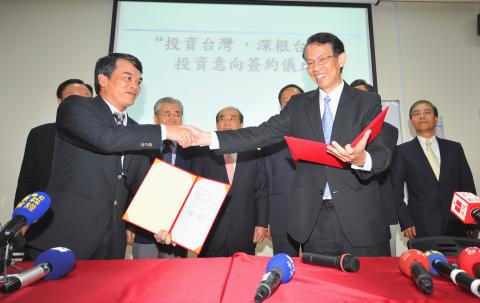Innolux Corp (群創光電), the nation’s top LCD panel maker, said yesterday it planned to invest up to NT$90 billion (US$2.9 billion) to build a new sixth-generation factory to produce high-definition slim screens for mobile phones in an effort to capitalize on fast-growing demand.
The investment is the first large-scale capacity expansion plan unveiled by a local LCD firm since the industry’s slump during the 2008-2009 global financial crisis, with Innolux emerging from financial woes amid recovering demand.
“We will invest in the world’s most advanced low-temperature polysilicon [LTPS] technology. This investment will help Innolux improve its share in the mobile phone segment,” Innolux president Wang Jyh-chau (王志超) told a media briefing yesterday.

Photo: Huang Chih-yuan, Taipei Times
Innolux has a strong position worldwide in the TV, monitor and notebook computer panel segments, but it lags far behind rivals including Japan Display Inc in the mobile phone panel segment, Wang said, adding that the firm only had an 8 percent share of the world’s handset panel market last quarter.
“Enhancing mobile phone panel technologies and improving our market position are very important steps for the company to migrate to the next phase,” Wang said.
Hon Hai Precision Industry Co (鴻海精密) chairman Terry Gou (郭台銘) also attended the briefing. The world’s largest electronics components maker, which assembles iPhones and iPads for Apple Inc, has about a 4.61 percent stake in Innolux, while Gou himself has a 2.45 percent stake in the Miaoli-based panelmaker.
“We are working at full speed to build this factory, as a lot of customers are waiting [to order products],” Gou said.
Earlier yesterday, Innolux and Hon Hai, as well as several high-ranking government officials, including Vice Premier Mao Chi-kuo (毛治國), Legislative Speaker Wang Jin-pyng (王金平) and Minister of Science and Technology Simon Chang (張善政), attended a signing ceremony at the site for the factory in the Southern Taiwan Science Park (南部科學園區) in Luzhu District (路竹), Greater Kaohsiung.
The factory is also expected to meet “exclusive demand from customers,” Innolux said.
Apple is the world’s biggest consumer of LTPS panels, which are used in all of its iPhone models, according to market researcher NPD DisplaySearch.
The new plant is to begin operation in April 2016. Upon the project’s completion, the plant is expected to add a monthly capacity of 30,000 to 50,000 sheets the next year to Innolux’s 400,000-sheet monthly capacity.
Currently, the company makes LTPS flat panels at a less advanced 4.5-generation factory.
As part of the investment project, Innolux plans to increase capacity of its existing 8.5-generation factory by up to 20,000 a month to cope with rising demand for TV panels. The company said it runs the 8.5-generation plant at full capacity now.
Innolux expects the investment to create 2,300 jobs in the Luzhu industrial area, which houses 60 companies and 6,000 workers.
The investment will also include the construction of LCD module assembly lines in neighboring areas, Innolux said.
Hon Hai already operates a joint 10th-generation factory in Japan for large TV panels and a fifth-generation plant in China for small and medium-sized screens.
Innolux shares rallied 2.4 percent to NT$14.95 and Hon Hai shares rose 0.73 percent to NT$96.7 yesterday, compared with the broader market’s 1.29 percent increase.

Intel Corp chief executive officer Lip-Bu Tan (陳立武) is expected to meet with Taiwanese suppliers next month in conjunction with the opening of the Computex Taipei trade show, supply chain sources said on Monday. The visit, the first for Tan to Taiwan since assuming his new post last month, would be aimed at enhancing Intel’s ties with suppliers in Taiwan as he attempts to help turn around the struggling US chipmaker, the sources said. Tan is to hold a banquet to celebrate Intel’s 40-year presence in Taiwan before Computex opens on May 20 and invite dozens of Taiwanese suppliers to exchange views

Application-specific integrated circuit designer Faraday Technology Corp (智原) yesterday said that although revenue this quarter would decline 30 percent from last quarter, it retained its full-year forecast of revenue growth of 100 percent. The company attributed the quarterly drop to a slowdown in customers’ production of chips using Faraday’s advanced packaging technology. The company is still confident about its revenue growth this year, given its strong “design-win” — or the projects it won to help customers design their chips, Faraday president Steve Wang (王國雍) told an online earnings conference. “The design-win this year is better than we expected. We believe we will win

Quanta Computer Inc (廣達) chairman Barry Lam (林百里) is expected to share his views about the artificial intelligence (AI) industry’s prospects during his speech at the company’s 37th anniversary ceremony, as AI servers have become a new growth engine for the equipment manufacturing service provider. Lam’s speech is much anticipated, as Quanta has risen as one of the world’s major AI server suppliers. The company reported a 30 percent year-on-year growth in consolidated revenue to NT$1.41 trillion (US$43.35 billion) last year, thanks to fast-growing demand for servers, especially those with AI capabilities. The company told investors in November last year that

Power supply and electronic components maker Delta Electronics Inc (台達電) yesterday said it plans to ship its new 1 megawatt charging systems for electric trucks and buses in the first half of next year at the earliest. The new charging piles, which deliver up to 1 megawatt of charging power, are designed for heavy-duty electric vehicles, and support a maximum current of 1,500 amperes and output of 1,250 volts, Delta said in a news release. “If everything goes smoothly, we could begin shipping those new charging systems as early as in the first half of next year,” a company official said. The new